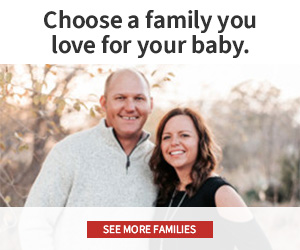As a birth mother who gave her identical twin boys up for adoption 54 years ago, I can tell you how relieved I am to learn that the old phraseology is now being frowned upon. As I was struggling through the “should I?” or “should I not?” those many years ago, my family repeatedly told me, in no uncertain terms, to “give them up for adoption.” Period. The status quo language in the mid-1960s was “Giving a Child Up for Adoption”. That statement was part of me for a long time. What had I done? What kind of a person was I to be able to “give away” my own flesh and blood?
The phrase “giving a child up for adoption” is profoundly negative. Consider, if you fail at something, you “give up”. The negativity of this magnitude about adoption will resonate with birth parents again and again and again through the years. The few times I did open up about giving my boys up for adoption, I was met with an appalling, “How could you have done such a thing?”
The language of adoption is so vitally important if you are a birth mother and even more important, I am sure if you are an adoptee. The negative connotation of “giving up,” “giving away,” or “giving up a child for adoption” will stick with birth parents and adoptees for years. Think of the birth parent(s) always feeling guilty for having given their very own child away. I cannot even imagine an adoptee growing up believing they were “given away.” The effect on their self-esteem would be unimaginable.
Sierra Kilpatrick in her 2014 article “I Did Not Give Up My Baby” on Adoption.com gives us the definition of “give up.” She says it means to “‘cease making an effort; resign oneself to failure’…When someone says ‘you gave your baby up,’ that essentially says, ‘You decided to not make an effort as a parent, and you are a failure.’”

She further compares “giving up” with “placing” a child for adoption. She writes, “When a birth mom chooses adoption…She is lovingly placing her child into the arms of someone else. She is trusting that another woman will give her child the love of two mothers. It is a particular position that is done out of love.”
I can personally speak to the damage that is done by using or buying into this negative adoption language. Giving a child up for adoption is one of the most selfless acts a person can do in a lifetime. So, why then is it made to sound like a criminal offense to give away your children? It is so devastating to surrender your child for adoption. But then to also be made to bear the unnecessarily shameful burden of thinking you did something terribly wrong is simply unconscionable.
When I first met one of my identical twin boys two years ago, I kept trying to remember to use the phrase that I placed them for adoption because I was too young. I placed them for adoption because I did not have any family support. I placed them for adoption after learning that their birth father was a heroin addict.
Even two years later, I still feel that I must work at remembering to use the new phraseology when we discuss his adoption. I am not withholding any information from him, but for 52 years I had carried the unfathomable guilt of “giving my boys up” for adoption. I was always questioning what kind of woman I was to have signed the papers to give my children away. Those were the negative phrases that were used way back then. “Giving a child up for adoption” was standard adoption language. I did not want my son to have to deal with that negative phrase.
Old adoption language came from specific historical and social contexts:
“‘Put Up’ for adoption: This term originated from the Orphan Train Movement of the mid-1800s when homeless children from the cities were taken to the countryside and ‘put up’ on stage for landowners to select. These children became the landowner’s property and were taken home to work as field hands.”
This goes on to explain the use of the phrase “give up”: “People tend to use the phrase ‘give up’ when referring to bad things or destructive habits…Additionally, the subtle connotation of the term “give up” suggests an indiscriminate and careless action. On the contrary, birth parents undergo an intense emotional experience to make this choice…and display remarkable strength in moving forward with their adoption plan.”
When I began researching for this article, I was disappointed to find how often “giving a child up for adoption” is still being used nowadays. Granted, its negative impact is recognized. Yet, when you do any search on adoption as a prospective birth parent, the phrase is being used liberally. It appears on adoption agency websites, albeit there are disclaimers that it is understood that this phrase is detrimental to both the adoptee and the woman who gave birth to them.
Some adoption agencies feel they have valid reasoning for their use of the phrase, and they explain these reasons on their websites. They reason that, oftentimes, the birth mothers they work with are first-time birth mothers; they have not had an experience with adoption yet. That leaves birth mothers unfamiliar with the adoption triad, adoption community, and the modern adoption terminology used. “Giving a baby up for adoption” is simply the term birth mothers most often hear used. So, agencies use that phrase to help birth mothers navigate their website and find the information they need about placing a child for adoption. Agencies that use this phrase have also been known to explain that they don’t take their temporary use of the phrase lightly and that they merely use it until they have the chance to explain to birth mothers why the phrase is inconsiderate of both birth mothers and their children. Following this explanation, positive adoption terminology is taught and then used.
I do not think I am satisfied with that justification of using the old, outdated phrase as often as they do throughout their websites. Just about every agency I searched had references to giving a child up for adoption. I cannot help but think that this perpetuates the use of a phrase and this thinking whose time is long overdue to be done with. Why not get rid of its use once and for all?
“…Words matter. They always will,” John Trump from the Carolina Daily Journal says in January 2019. In his article, Trump shares with us the importance of words from his perspective of many years in journalism. “Because each word carries in its meaning a unique gravity, real and perceived….Words matter.”
Certainly, if one were to search just the word “adoption” they would be directed to a plethora of information. There are so many options to pursue. One can easily navigate these sites to find whatever information they need without having to type in old, outdated terminology that should no longer be in print.
To further address the phrase “giving a child up for adoption,” Terra Cooper shares her thoughts about what a birth mother really does “give up.”
She goes on to say that, “As a birth mother, you GIVE life. You GIVE that child a family. You GIVE unconditional love. You GIVE part of your heart, which will never feel whole. You GIVE another mother a part of her heart that was always missing.” This is the explanation I am comfortable using to describe what I did. Actually, it would be far more appropriate to think you did not “give up,” but you “gave in” to the overwhelming responsibilities and decisions thrust upon you. I spent so many months struggling to figure out if I would be able to keep my twin boys. When all was said and done, I gave in to the fact that I didn’t have the ability to raise two boys totally on my own. I gave up on the idea of my being a mother at age 18. I gave up the hope that I could provide for them and give them the opportunities they deserved, and I decided they would have a much happier life if I placed them than I could ever have given them.
I turned to Wikipedia’s “Language of adoption” for their take on some of the terminology. Their “positive adoption language” is listed here:
- Non-Preferred: “give up for adoption”
- Positive Adoption Language: “Place for adoption or make adoption plan”
- Reasons Stated for Preference: “‘Give up’ implies lack of value”
They go on to point out further distinctions of using “honest adoption language”:
Pregnant and considering adoption?
Get your free adoption benefits and support bundle

- Non-Preferred: “Place or give up for adoption”
- Positive Adoption Language: “Surrender for Adoption or be separated by adoption”
- Reasons Stated for Preference: “”Surrender’ is the legal term for a mother’s signing a Termination for Parental Rights.”
This verse and chorus from the 2007 song “Tattoo” by Jordin Sparks, I believe best sums up the effect of adoption on a birth mother:
“I loved you once, needed protection
You’re still a part of everything I do
You’re on my heart just like a tattoo
Just like a tattoo
I’ll always have you
I’ll always have you
I’ll always have you”
Katala Peterson, in her article “Babies Up For Adoption: Why We Don’t Use That Phrase” imparts a very real reason for the need for positive adoption language. “Chances are, today you know someone who was adopted as an infant or is closely related to someone who was. It is an incredible miracle that is far more discreet than we often realize. But the way it’s addressed is often obtrusive and rough…The title of this article is considered negative adoption language, as it dehumanizes a birth mother’s choice…”
I carried the stigma of having given my boys away for adoption for 52 years. Other than my ex-husband, I never shared my story with anyone but my one dear friend. No one else had a clue.
It was the first night I met my son. He told me he and his brother always knew they were adopted. They never wanted anything, and they never hated me. They held no negative feelings toward me because they felt, with me being so young, I was doing all that I could for them. I remember looking at him in near disbelief! He was being sincere and assured me that this is how he and his brother really felt. After all the years of harboring shame and guilt, I was finally absolved. I was free of my secret. I just could not wait to tell everyone I knew my story. I wanted the world to know and understand this major event in my life. It had been such a deep dark secret for so many years in my life, and I was finally able to celebrate that I had given birth to two boys and was now able to relish the joy.
I clearly remember explaining to my youngest daughter how I became pregnant as a teen and had identical twin boys who had been adopted. Her first words to me were, “You were so brave. Why didn’t you ever tell me?” I told her I could not have told her because I was ashamed. I did not want her to know what a “bad” girl I was. But I wasn’t bad; not at all.
If you are struggling with making the decision of what steps to take when your baby arrives. Or, if you have already decided that the only recourse that makes sense is to offer your child for adoption. I implore you not to buy into any negative adoption phrases. What you are giving is an opportunity for your child to have a better life than the one you could currently provide for them. This is a positive, generous, thoughtful thing you are doing. It is a great act of love. More than likely one of the most, if not the most, unselfish things you will ever do in life.
Are you considering placing a child for adoption? Not sure what to do next? First, know that you are not alone. Visit Adoption.org or call 1-800-ADOPT-98 to speak to one of our Options Counselors to get compassionate, nonjudgmental support. We are here to assist you in any way we can.
Adoption.com offers a variety of services for individuals considering placing a baby for adoption:
- Information and Education: Access comprehensive resources to learn about the adoption process, rights, and options available to birth parents.
- Connection with Adoption Professionals: Connect with adoption agencies, attorneys, and counselors who can provide guidance, support, and assistance throughout the adoption journey.
- Adoption Profiles: Browse profiles of waiting adoptive families to find the right match for your baby and your preferences.
- Support Forums and Communities: Engage with support groups and online communities to connect with others who are considering adoption or have gone through similar experiences.
- Articles and Resources: Explore articles, blogs, and other resources written by adoption professionals, birth parents, and adoptive families to gain insights and advice on navigating the adoption process.
The Gladney Center for Adoption is a renowned organization dedicated to facilitating adoptions with compassion and professionalism. Their mission is to provide comprehensive support to birth mothers, adoptive families, and children, ensuring each individual’s needs are met throughout the adoption process and beyond. With personalized counseling, resources, and a commitment to honoring birth mothers’ choices, Gladney appeals to birth mothers by offering a supportive environment where they can make empowered decisions for themselves and their children.


